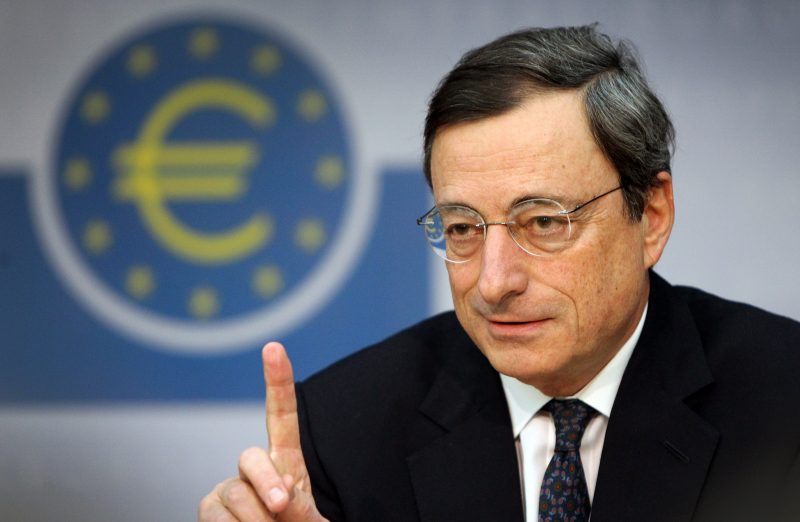ECB extends historic low rates, details cheap bank loans
ECB chief Mario Draghi is expected to try and concerns about eurozone growth at a Thursday press conference (DANIEL ROLAND)
Vilnius (AFP) – European Central Bank (ECB) governors on Thursday agreed to hold key interest rates at historic lows until at least mid 2020, a spokesman confirmed, adding at least six months to a key policy for stimulating growth and inflation as clouds loom over the 19-nation eurozone.
The ECB’s main refinancing rate remains at zero, while financial firms must pay a negative interest rate of 0.4 percent on deposits with the central bank.
The ECB spokesman added that the Frankfurt institution would offer highly favourable interest rates to banks in a third round of a massive lending scheme known as TLTRO.
If lenders in turn provide enough credit to the wider economy, the ECB could offer interest as low as -0.3 percent — in effect paying them to borrow money.
President Mario Draghi is now in the spotlight to outline yet further steps the Frankfurt-based institution could take to combat uncertainty over future growth and inflation in the 19-nation eurozone at a press conference in Vilnius.
“Market participants will turn to Mario Draghi for any new hint at how exactly all (the) ECB’s instruments could be implemented, if needed,” said Frederik Ducrozet, a strategist at Pictet Wealth Management.
The ECB chief is expected to repeat his April stance that the bank stands ready to open its “toolbox” that he insists contains “plenty of instruments” to respond to any downturn.
After a weak patch for the eurozone in late 2018, economic expansion bounced back between January and March, gaining 0.4 percent from the previous quarter.
That would normally be good news, with faster growth accelerating inflation towards the central bank’s price stability target.
However, trade tensions between the United States and its main partners China, the European Union and Mexico have stoked fears that a hoped-for stronger second half to 2019 will not materialise.
On top of overseas threats, worries closer to home include a budget confrontation between Brussels and Rome, Greek elections and a possible no-deal Brexit following the departure of British Prime Minister Theresa May.
Economists say business confidence surveys undermined by uncertainty and subdued market expectations for price growth add up to a need for the ECB to do more.
Eurozone inflation fell back to just 1.2 percent in May, from 1.7 percent in April.
– ‘Risk has grown’ –
Meanwhile, so-called “five-year/five-year” swaps — which reflect how financial players judge the pace of price growth between five and 10 years from now — currently almost match their mid-2016 level of 1.25 percent, their lowest ebb under Draghi’s eight-year tenure.
That is far from the central bank’s inflation goal of just below 2.0 percent.
“The risk has grown of inflation expectations becoming ‘de-anchored'” from the ECB’s target, said Eric Dor of France’s IESEG business school.
On top of lower-for-longer rates and TLTROs, another option the ECB is “looking at” is a so-called “tiering” scheme.
That would exempt some banks’ deposits in Frankfurt from a costly negative interest rate of -0.4 percent.
The charge, mostly paid by German and French banks, costs lenders around 7.5 billion euros ($8.4 billion) per year.
“Under pressure or not, the ECB will do everything it can to keep the ‘whatever it takes’ spirit alive,” ING Diba bank economist Carsten Brzeski said — harking back to Draghi’s watershed 2012 speech widely credited with keeping the euro intact.
– Fresh forecasts –
Less likely for now — because it’s fraught with political risk — would be a relaunch of “quantitative easing” (QE) net purchases of government and corporate bonds, which between March 2015 and December 2018 amounted to 2.6 trillion euros.
Observers will also pore over the latest quarterly economic forecasts from the ECB staff, who are expected to present a cautious take on how growth, inflation and other indicators will develop in the coming years.
With June’s meeting the first for former Central Bank of Ireland head Philip Lane in his new role as chief economist, any changes to the ECB’s forecasts over the coming quarters are sure to be closely scrutinised.
Disclaimer: Validity of the above story is for 7 Days from original date of publishing. Source: AFP.


